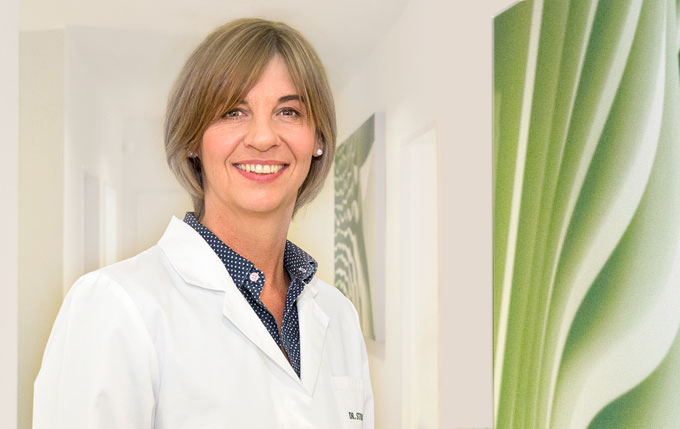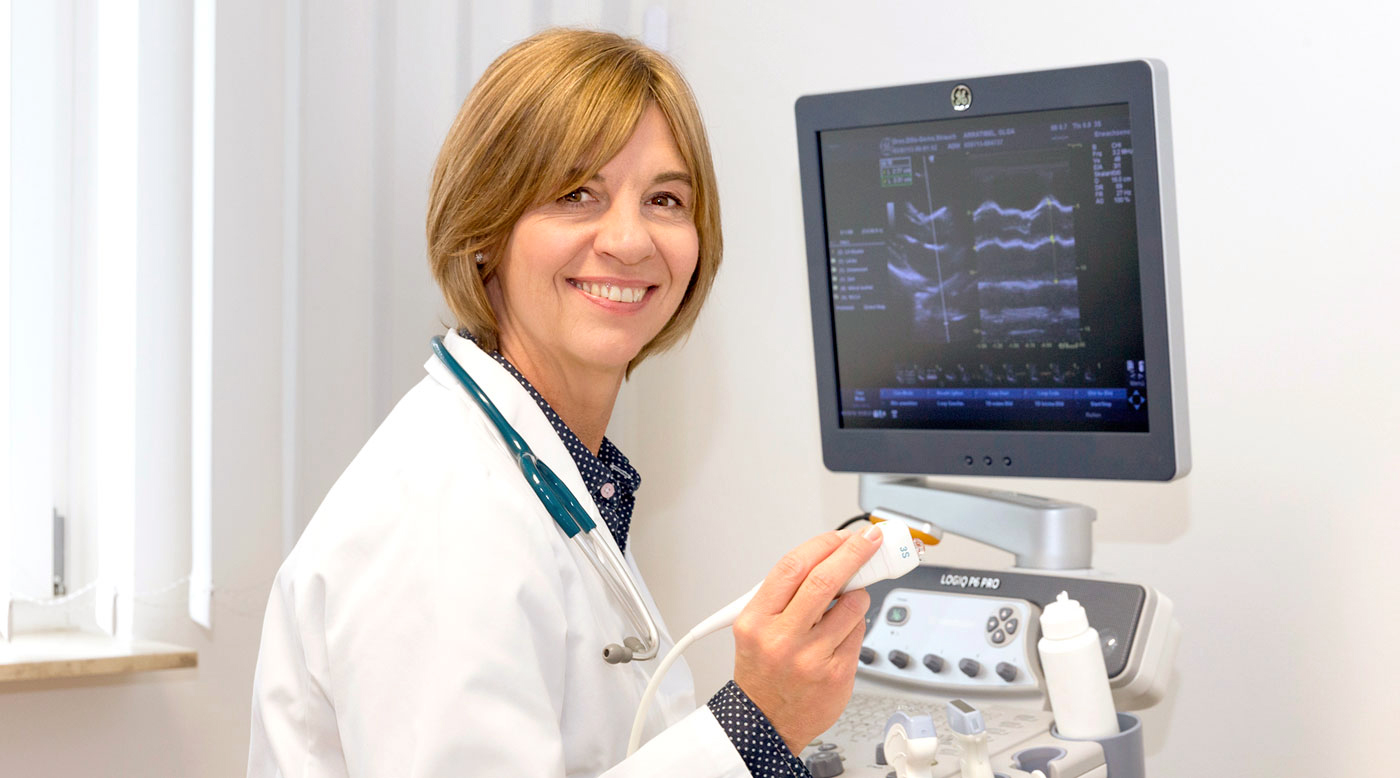„We are here to serve you – with the help of our in-depth experience, the latest medical insights, and a strong network of excellence made up of regional healthcare specialists.“


Our services
We are counted among the most respected private practices for internal medicine in Frankfurt/Main. In-depth experience, profound medical expertise, and individualised care – these are the cornerstones of our work. But our patients also benefit from a strong network of healthcare specialists which we have built up over the years. Because for over a decade, we have been successfully collaborating with renowned specialists in the Rhine-Main region and beyond.
Prevention
According to recent studies, approx. 40 percent of women get regular check-ups – but only 18 percent of men do. However, it’s wise to remember that check-ups really are a good investment when it comes to your health. Because the following is true of many diseases: The sooner they are diagnosed, the more effectively they can be treated. And naturally a medical check-up is worth your time even if your healthcare specialist doesn’t find anything wrong with you – because is there anything more reassuring than to hear your doctor say “Everything is fine”?
Check-Up:
> Physical status, detailed laboratory tests
> Stress ECG, lung function test
> Ultrasound – abdomen/thyroid/heart/neck vessels
> Formulation of a risk profile
> Early detection of colorectal carcinomas (fob test/immunological stool test)
> Cancer screening men
> Nutritional advice
> Smoking cessation
Primary Care
As GPs/primary care physicians, we are your first point of contact for all acute or chronic, physical or emotional issues or questions.
If you have a medical emergency, we will give you a same-day appointment.
Our range of primary care includes:
> Primary care services for patients with acute and chronic diseases
>Coordination and initiation of examinations and treatments by specialists from other disciplines
> Medical check-ups and/or cancer screenings
> Vaccinations and immunisation advice
> Pre- and post-hospital care, preparation for surgery
> Medical wound care
> House calls upon request
> Fit/sick notes for work and school, medical certificates of competency, expert opinions for pension offices and insurance companies, applications for health cures, prescriptions for activities that enable progressive reintegration into the workplace
> Prescriptions for remedies, prescriptions for home nursing
> Living wills
Gastro-intestinal diseases
Our services:
> Ultrasound of the abdominal organs
> Laboratory tests (incl. Helicobacter pylori and allergy tests as well as tumour markers)
> arly detection and medical advice on food allergies,
lactose-, fructose-, sorbitol-, histamine- and gluten intolerances, irritable bowel syndrome
> Recall system to ensure adherence to your screening intervals for early detection (colonoscopy)
Gastro-intestinal diseases include a variety of different diseases of the oesophagus, stomach, small- and large intestine, pancreas, liver, and gallbladder.
Common medical complaints are e. g. heartburn, loss of appetite, bloating, burping, abdominal pain, diarrhoea or constipation, flatulence or cramps, weight loss or blood in the stool.
After you have told us in detail about the type of complaints you have, when they occur, how long they last and what other symptoms you may be experiencing, we will examine you and perform an abdominal ultrasound. We will arrange to have the appropriate laboratory tests done and, if necessary, also ask you to provide a stool sample for testing.
If we suspect you may be suffering from food allergies or food intolerances, we will brief our laboratories accordingly so that they can focus on these specific issues during screening.
If there are no detectable organic causes for your symptoms, you may be suffering from irritable bowel syndrome (IBS) which can be treated in various ways. The more these treatment options are tailored to meet the needs of the individual patient, the more successful they tend to be.
Cardiology
Many underlying conditions can cause the heart to not function properly: poor circulation in the coronary arteries (coronary heart disease); heart rhythm disorders; heart muscle conditions caused e. g. by acute infections, heart failure (cardiac insufficiency), diseases of the heart valves or congenital heart defects. Our surgery offers you the following services for cardiac diagnosis:
> Resting ECG
> Long-term ECG (24 hrs)
> Stress ECG
> Long-term blood pressure measurement (24 hrs)
> Cardiac ultrasound
In case further cardiac tests become necessary, e.g. a stress echocardiography, a cardiac CT, or a cardiac catheterisation if there is existing or suspected coronary heart disease – or if you need a hospital bed at short notice due to an acute heart rhythm disorder, you benefit from our established network of renowned specialists in Frankfurt which we have built up over the last decades.
Diseases of the veins and arteries
In the arteries, arterial calcification (or ‘arteriosclerosis’ as it is called in medicine) is the cause of many serious diseases. Simply put, calcifications cause the blood vessels to become narrower and narrower, until the supply of blood to the surrounding tissue is no longer guaranteed.
This leads to malfunctions. Blood clots may also form on these modified vessel walls, become dislodged and then cause a blockage in smaller ‘downstream’ blood vessels (embolism).
Calcification of arteries in the brain can thus cause a stroke, and calcification of the coronary arteries can lead to a heart attack. On the other hand, calcification in the arteries of the leg (peripheral arterial occlusive disease/PAD) can manifest as something called “window-shopping disease” in German, also known as “intermittent/vascular claudication”: People affected by this condition experience pain caused by insufficient blood circulation in the leg muscles. This forces them to keep stopping every few metres – as though they were window shopping.
> Ultrasound diagnostics of blood-vessel-related diseases
> Ultrasound diagnostics of the blood vessels in the neck
> Ultrasound diagnostics of the abdominal blood vessels
> Ultrasound diagnostics for vein-related diseases
Lung
Measuring lung function with the help of specialised equipment gives us valuable information when diagnosing acute respiratory diseases, e.g. bronchitis or pneumonia, or chronic lung diseases such as asthma or COPD (chronic obstructive pulmonary disease). It also helps us monitor whether treatments are successful.
> Lung function test
> Allergy test
Travel medicine
If you are planning a trip abroad, we will gladly tell you about the current vaccination requirements and -recommendations and about precautionary measures which may be medically advisable. If you have one, please bring your vaccination certificate to the appointment and give us your travel dates and chosen destination(s). We will be happy to provide you with a personalised vaccination schedule in writing. We will also inform you about the current recommendations on malaria prophylaxis which you may need and will put together a customised first aid kit for your travels.
We will help you decide which vaccination is necessary and/or advisable in your situation.
The following sources contain pertinent information on frequently occurring infectious diseases and on vaccinations which are recommended when travelling abroad. Key sites for advice on safe travel:
Further important information:
www.cdc.gov/travel
www.who.int/csrwww.dtg.org
www.rki.de
www.auswaertiges-amt.de
www.travelmed.de
www.reisemedizin.de
Vaccinations
The vaccinations which we recommend and perform always comply with the current recommendations of the German Standing Committee on Vaccination (STIKO) at the Robert Koch Institute Berlin.
Everyone should be vaccinated to adequately protect against:
> Tetanus
> Diphtheria
> Pertussis (whooping cough)
> Measles, mumps, rubella (MMR)
These vaccinations are well tolerated.
In Germany, the STIKO also recommends the following vaccinations for certain at-risk groups:
> Flu shot
> Polio vaccination
> Pneumococcal vaccination
> Hepatitis A vaccination
> Hepatitis B vaccination
> Early summer meningoencephalitis/tick-borne encephalitis (TBE) vaccination
> Meningococcal vaccination
We would be happy to check whether your vaccination status is up-to-date! If you have one, please bring your vaccination certificate to the appointment. If not, we will discuss which vaccinations you may need when you come to see us – just ask!
Metabolic diseases
Diabetes is a very common metabolic disease in which the body either does not produce enough insulin or does not react to insulin.
Lipid metabolism disorders such as elevated cholesterol levels play a key role as risk factors for the development of cardiovascular diseases like atherosclerosis, heart attack and stroke.
The two most well-known metabolic diseases which affect the bones and joints are osteoporosis and gout.
ZMetabolic diseases also include thyroid diseases such as hyper- or hypothyroidism in which the thyroid gland produces too much or too little of the hormone thyroxine; in both cases, metabolism is impaired.
Metabolic diseases can be congenital or acquired, and treatment depends on which disease a patient is suffering from. Therapy can include drugs, but often lifestyle modifications (more exercise, weight loss etc.) are helpful or even essential.
Allergy / Diagnostics / Treatment (specific immunotherapy)
Allergies usually begin in a benign way. However, you should seek medical advice and undergo an examination as early as possible after the onset of an allergy. Because only when you know what ‘your personal allergens’ are, can you try to avoid them and/or begin treatment such as hyposensitisation (specific immunotherapy) for long-term relief.
Often, the diagnosis may already be clear after tracking your medical history and doing a simple skin prick test. But sometimes we need to engage in real ‘detective work’ before we can conclusively identify the allergens that trigger your condition.
If we suspect you are suffering from a so-called type-I-allergy (immediate allergy, e.g. hay fever), we will perform a so-called ‘skin prick test’ which tests for the most common inhalant allergens such as early-, medium- and late bloomers, animal epithelia, house dust mites, moulds etc.
Food allergies are diagnosed with the help of special laboratory tests.
Laboratory diagnostics
By networking with the Collaborative Laboratory Rhine-Main and the Laboratory of Dres. Walther, Weindel and Colleagues, we can access the entire diagnostic spectrum of highly-specialised laboratories.
Your laboratory results from most routine examinations reach us before 6 p.m. on the same day, and when necessary they are sent to us the same afternoon via fax or e-mail. However, laboratory procedures for certain tests, e.g. for identifying viruses, are rather more complex. This means it may take 2 to 3 days or longer before we receive your results.
You no longer need to fast before having a blood sample taken!
For urine and stool samples, please use only the special disposable containers which are available in every pharmacy. The laboratory needs so-called midstream urine for accurate results, so please catch only the middle portion in the urine cup – half a cup full is enough. For microbiological tests, e.g. determining urinary tract infection pathogens and testing their sensitivity to certain antibiotics, the sample must be transported correctly and processed immediately. That is why urine samples – as well as stool and saliva samples – should not be handed in to us e.g. late on Fridays over the weekend. Please try to deliver your samples to our staff in the morning hours whenever possible, ideally before noon.
Endocrine disorders
Hormones are produced by the so-called ‘endocrine organs’:
> Thyroid
> Pancreas
> Adrenals
> Pituitary gland
> Testicles
> Ovaries
Endocrine disorders can have a significant negative impact on your general well-being or even on your physical health. Some common examples are dysfunctions of the thyroid gland or the pancreas, which can lead to metabolic diseases like diabetes. But high blood pressure can also be the result of an endocrine disorder. Our range of services includes the early detection and treatment of acute and chronic disorders as well as the management of secondary diseases.
Coaching and health
Bodily symptoms are not always caused by physical factors but can also be the ‘embodiment’ of stress someone is experiencing in their work or life.
„I always feel pressured“
„I find it hard to relax“
„All I’m doing is functioning“
„I’m in a situation that isn’t good for me“
„I find it difficult to make decisions“
„I don’t have time for the important things in my life“
„I want to switch jobs“
„I miss feeling joy in my life“
Exhaustion, listlessness, back pain, gastro-intestinal symptoms, headaches, heart problems, sleep disorders or increased susceptibility for infections do not always have a physical cause: Often, these kinds of symptoms are the body’s way of signalling that it is experiencing stress. Medical treatment of the symptoms will not lead to a lasting improvement in quality of life, because it doesn’t factor in the underlying causes.
What keeps people healthy?
What is coaching?
Who is my coach?
Medically-supervised weight management
If you want to lose weight successfully (you may have already tried various diets and now want to address the issue again), it can be a good idea to identify your personal needs with regard to your eating habits so that we can work together to develop your own customised weight-loss strategy.
Prevention
According to recent studies, approx. 40 percent of women get regular check-ups - but only 18 percent of men do. However, it’s wise to remember that check-ups really are a good investment when it comes to your health. Because the following is true of many diseases: The sooner they are diagnosed, the more effectively they can be treated. And naturally a medical check-up is worth your time even if your healthcare specialist doesn’t find anything wrong with you – because is there anything more reassuring than to hear your doctor say “Everything is fine”?
Check-Up:
> Physical status, detailed laboratory tests
> Stress ECG, lung function test
> Ultrasound – abdomen/thyroid/heart/neck vessels
> Formulation of a risk profile
> Early detection of colorectal carcinomas (fob test/immunological stool test)
> Cancer screening men
> Nutritional advice
> Smoking cessation
Cardiology
Many underlying conditions can cause the heart to not function properly: poor circulation in the coronary arteries (coronary heart disease); heart rhythm disorders; heart muscle conditions caused e. g. by acute infections, heart failure (cardiac insufficiency), diseases of the heart valves or congenital heart defects. Our surgery offers you the following services for cardiac diagnosis:
> Resting ECG
> Long-term ECG (24 hrs)
> Stress ECG
> Long-term blood pressure measurement (24 hrs)
> Cardiac ultrasound
In case further cardiac tests become necessary, e.g. a stress echocardiography, a cardiac CT, or a cardiac catheterisation if there is existing or suspected coronary heart disease – or if you need a hospital bed at short notice due to an acute heart rhythm disorder, you benefit from our established network of renowned specialists in Frankfurt which we have built up over the last decades.
Diseases of the
veins and arteries
In the arteries, arterial calcification (or ‘arteriosclerosis’ as it is called in medicine) is the cause of many serious diseases. Simply put, calcifications cause the blood vessels to become narrower and narrower, until the supply of blood to the surrounding tissue is no longer guaranteed.
This leads to malfunctions. Blood clots may also form on these modified vessel walls, become dislodged and then cause a blockage in smaller ‘downstream’ blood vessels (embolism).
Calcification of arteries in the brain can thus cause a stroke, and calcification of the coronary arteries can lead to a heart attack. On the other hand, calcification in the arteries of the leg (peripheral arterial occlusive disease/PAD) can manifest as something called “window-shopping disease” in German, also known as “intermittent/vascular claudication”: People affected by this condition experience pain caused by insufficient blood circulation in the leg muscles. This forces them to keep stopping every few metres – as though they were window shopping.
> Ultrasound diagnostics of blood-vessel-related diseases
> Ultrasound diagnostics of the blood vessels in the neck
> Ultrasound diagnostics of the abdominal blood vessels
> Ultrasound diagnostics for vein-related diseases
Vaccinations
The vaccinations which we recommend and perform always comply with the current recommendations of the German Standing Committee on Vaccination (STIKO) at the Robert Koch Institute Berlin.
Everyone should be vaccinated to adequately protect against:
> Tetanus
> Diphtheria
> Pertussis (whooping cough)
> Measles, mumps, rubella (MMR)
These vaccinations are well tolerated.
In Germany, the STIKO also recommends the following vaccinations for certain at-risk groups:
> Flu shot
> Polio vaccination
> Pneumococcal vaccination
> Hepatitis A vaccination
> Hepatitis B vaccination
> Early summer meningoencephalitis/tick-borne encephalitis (TBE) vaccination
> Meningococcal vaccination
We would be happy to check whether your vaccination status is up-to-date! If you have one, please bring your vaccination certificate to the appointment. If not, we will discuss which vaccinations you may need when you come to see us – just ask!
Metabolic diseases
Diabetes is a very common metabolic disease in which the body either does not produce enough insulin or does not react to insulin.
Lipid metabolism disorders such as elevated cholesterol levels play a key role as risk factors for the development of cardiovascular diseases like atherosclerosis, heart attack and stroke.
The two most well-known metabolic diseases which affect the bones and joints are osteoporosis and gout.
ZMetabolic diseases also include thyroid diseases such as hyper- or hypothyroidism in which the thyroid gland produces too much or too little of the hormone thyroxine; in both cases, metabolism is impaired.
Metabolic diseases can be congenital or acquired, and treatment depends on which disease a patient is suffering from. Therapy can include drugs, but often lifestyle modifications (more exercise, weight loss etc.) are helpful or even essential.
Endocrine disorders
Hormones are produced by the so-called ‘endocrine organs’:
> Thyroid
> Pancreas
> Adrenals
> Pituitary gland
> Testicles
> Ovaries
Endocrine disorders can have a significant negative impact on your general well-being or even on your physical health. Some common examples are dysfunctions of the thyroid gland or the pancreas, which can lead to metabolic diseases like diabetes. But high blood pressure can also be the result of an endocrine disorder. Our range of services includes the early detection and treatment of acute and chronic disorders as well as the management of secondary diseases.
Coaching and
health
Bodily symptoms are not always caused by physical factors but can also be the ‘embodiment’ of stress someone is experiencing in their work or life.
„I always feel pressured“
„I find it hard to relax“
„All I’m doing is functioning“
„I’m in a situation that isn’t good for me“
„I find it difficult to make decisions“
„I don’t have time for the important things in my life“
„I want to switch jobs“
„I miss feeling joy in my life“
Exhaustion, listlessness, back pain, gastro-intestinal symptoms, headaches, heart problems, sleep disorders or increased susceptibility for infections do not always have a physical cause: Often, these kinds of symptoms are the body’s way of signalling that it is experiencing stress. Medical treatment of the symptoms will not lead to a lasting improvement in quality of life, because it doesn’t factor in the underlying causes.
What keeps people healthy?
What is coaching?
Who is my coach?
Primary care
As GPs/primary care physicians, we are your first point of contact for all acute or chronic, physical or emotional issues or questions.
If you have a medical emergency, we will give you a same-day appointment.
Our range of primary care includes:
> Primary care services for patients with acute and chronic diseases
>Coordination and initiation of examinations and treatments by specialists from other disciplines
> Medical check-ups and/or cancer screenings
> Vaccinations and immunisation advice
> Pre- and post-hospital care, preparation for surgery
> Medical wound care
> House calls upon request
> Fit/sick notes for work and school, medical certificates of competency, expert opinions for pension offices and insurance companies, applications for health cures, prescriptions for activities that enable progressive reintegration into the workplace
> Prescriptions for remedies, prescriptions for home nursing
> Living wills
Gastro-intestinal
diseases
Our services:
> Ultrasound of the abdominal organs
> Laboratory tests (incl. Helicobacter pylori and allergy tests as well as tumour markers)
> arly detection and medical advice on food allergies,
lactose-, fructose-, sorbitol-, histamine- and gluten intolerances, irritable bowel syndrome
> Recall system to ensure adherence to your screening intervals for early detection (colonoscopy)
Gastro-intestinal diseases include a variety of different diseases of the oesophagus, stomach, small- and large intestine, pancreas, liver, and gallbladder.
Common medical complaints are e. g. heartburn, loss of appetite, bloating, burping, abdominal pain, diarrhoea or constipation, flatulence or cramps, weight loss or blood in the stool.
After you have told us in detail about the type of complaints you have, when they occur, how long they last and what other symptoms you may be experiencing, we will examine you and perform an abdominal ultrasound. We will arrange to have the appropriate laboratory tests done and, if necessary, also ask you to provide a stool sample for testing.
If we suspect you may be suffering from food allergies or food intolerances, we will brief our laboratories accordingly so that they can focus on these specific issues during screening.
If there are no detectable organic causes for your symptoms, you may be suffering from irritable bowel syndrome (IBS) which can be treated in various ways. The more these treatment options are tailored to meet the needs of the individual patient, the more successful they tend to be.
Lung
Measuring lung function with the help of specialised equipment gives us valuable information when diagnosing acute respiratory diseases, e.g. bronchitis or pneumonia, or chronic lung diseases such as asthma or COPD (chronic obstructive pulmonary disease). It also helps us monitor whether treatments are successful.
> Lung function test
> Allergy test
Travel medicine
If you are planning a trip abroad, we will gladly tell you about the current vaccination requirements and -recommendations and about precautionary measures which may be medically advisable. If you have one, please bring your vaccination certificate to the appointment and give us your travel dates and chosen destination(s). We will be happy to provide you with a personalised vaccination schedule in writing. We will also inform you about the current recommendations on malaria prophylaxis which you may need and will put together a customised first aid kit for your travels.
We will help you decide which vaccination is necessary and/or advisable in your situation.
The following sources contain pertinent information on frequently occurring infectious diseases and on vaccinations which are recommended when travelling abroad. Key sites for advice on safe travel:
Further important information:
www.cdc.gov/travel
www.who.int/csr
www.dtg.org
www.rki.de
www.auswaertiges-amt.de
www.travelmed.de
www.reisemedizin.de
Allergy
Diagnostics
Treatment (specific immunotherapy)
Allergies usually begin in a benign way. However, you should seek medical advice and undergo an examination as early as possible after the onset of an allergy. Because only when you know what ‘your personal allergens’ are, can you try to avoid them and/or begin treatment such as hyposensitisation (specific immunotherapy) for long-term relief.
Often, the diagnosis may already be clear after tracking your medical history and doing a simple skin prick test. But sometimes we need to engage in real ‘detective work’ before we can conclusively identify the allergens that trigger your condition.
If we suspect you are suffering from a so-called type-I-allergy (immediate allergy, e.g. hay fever), we will perform a so-called ‘skin prick test’ which tests for the most common inhalant allergens such as early-, medium- and late bloomers, animal epithelia, house dust mites, moulds etc.
Food allergies are diagnosed with the help of special laboratory tests.
Laboratory diagnostics
By networking with the Collaborative Laboratory Rhine-Main and the Laboratory of Dres. Walther, Weindel and Colleagues, we can access the entire diagnostic spectrum of highly-specialised laboratories.
Your laboratory results from most routine examinations reach us before 6 p.m. on the same day, and when necessary they are sent to us the same afternoon via fax or e-mail. However, laboratory procedures for certain tests, e.g. for identifying viruses, are rather more complex. This means it may take 2 to 3 days or longer before we receive your results.
You no longer need to fast before having a blood sample taken!
For urine and stool samples, please use only the special disposable containers which are available in every pharmacy. The laboratory needs so-called midstream urine for accurate results, so please catch only the middle portion in the urine cup – half a cup full is enough. For microbiological tests, e.g. determining urinary tract infection pathogens and testing their sensitivity to certain antibiotics, the sample must be transported correctly and processed immediately. That is why urine samples - as well as stool and saliva samples - should not be handed in to us e.g. late on Fridays over the weekend. Please try to deliver your samples to our staff in the morning hours whenever possible, ideally before noon.
Medically-supervised
weight management
If you want to lose weight successfully (you may have already tried various diets and now want to address the issue again), it can be a good idea to identify your personal needs with regard to your eating habits so that we can work together to develop your own customised weight-loss strategy.

„We are here for you and want to make sure you understand the medical issues – that is an essential part of who we are. So that by taking the time to talk in depth, we can find the best treatment for your long-term health.“

News
Long-term allergy treatment
Specific immunotherapy can lead to the long-term improvement of annoying allergy symptoms.
If you are suffering from an insect-, pollen-, or house dust mite allergy, there are various options for hyposensitisation – with or without getting an injection!
Get in touch to find out more!
Understanding the body’s signals
Bodily symptoms are not always caused by physical factors but can also be the ‘embodiment’ of stress someone is experiencing in their work or life. Exhaustion, listlessness, back pain, gastro-intestinal symptoms, headaches, heart problems, sleep disorders or increased susceptibility for infections do not always have a physical cause. Often, these kinds of symptoms are the body’s way of signalling that it is experiencing stress. Medical treatment of the symptoms will not lead to a lasting improvement in quality of life, because it doesn’t factor in the underlying causes.
Please feel free to get in touch if, in addition to medical treatment, you would like to do something for your health.
Hormonal imbalance
Hormonal imbalance can have a significant negative impact on your general well-being or even your physical health – and it is often underdiagnosed. Non-specific symptoms such as e.g. fatigue, listlessness, difficulty concentrating or sleeping, weight gain or loss, mood swings, headaches, dizziness or blood pressure fluctuations can be the result of a hormonal imbalance.
Our range of services includes the early detection and treatment of acute and chronic disorders as well as the management of secondary diseases. Please feel free to contact us!
Metabolism – the body’s chemical plant
Lipid metabolism disorders such as elevated cholesterol levels play a key role as risk factors for the development of cardiovascular diseases like atherosclerosis, heart attack and stroke. Whether and to what extent they will cause disease and need to be treated greatly depends on your personal risk profile.
We’d be happy to offer medical advice on how you can protect yourself.
Please get in touch to learn more.
Our team
Internist

Dr. med. Silke Strauch
Medical
assistants

Gabriele Dahmer

Melanie Lehmann


